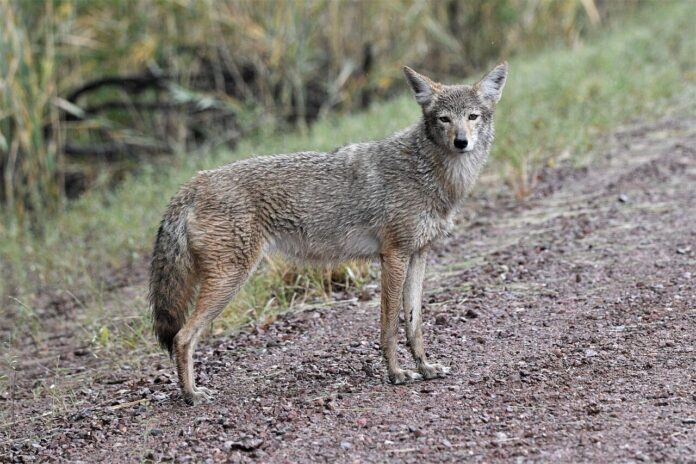With coyote mating season in full swing, sightings in the City of Nelson are on the rise. Here’s what you need to know to keep you and your pets safe.
An increase in coyote activity is not unusual for this time of year, according to WildSafe BC, whose website states that the BC Conservation Officer Service sees an increase in coyote reports during breeding season, which begins in February.
WildSafe BC says coyotes are well adapted to living close to human settlements. Human-coyote conflicts arise when they prey on young or small livestock or attack people’s pets.
While human attacks are rare, they can occur, especially if the animal becomes more comfortable around humans and has received a food reward, either through direct or indirect feeding.
The BC Conservation Service receives an average of around 1,100 calls per year relating to coyotes, with the majority occurring in urban settings.
To prevent harmful conflicts with the animal, the BC SPCA has listed the following tips on its website, which also aim to ensure coyotes don’t lose their natural wariness of humans.
- Never feed a coyote. If a coyote grows accustomed to being fed by humans, it will lose its fear of people, which can lead to unwanted conflicts and aggression.
- Manage rodent attractants. Remove seed from bird feeders and fallen fruit so coyotes are not drawn to your property. Voles, mice, rats, and squirrels make up the majority of a coyote’s diet.
- Keep garbage cans and compost bins clean and secured. In addition to preying on rodents, coyotes are scavengers who will take advantage of any available food sources.
- Keep your dog on a leash when out walking and never let your dog interact with, or chase, a coyote.
- Be extra vigilant in areas coyotes frequent – near golf courses, the edges of parks with overgrown vegetation, or fields with tall grasses.
- Keep cats indoors and monitor pets and small children outside.
- Protect farm animals. Use fencing at least two metres high, ensure cages are well-built, and ideally contain animals indoors at night.
- Spay and neuter your pets. Coyotes are attracted to and can mate with unspayed or unneutered dogs. Unspayed female dogs in heat will attract male coyotes, and unneutered dogs may be lured away by the scent of a female coyote in heat.
When to report
WildSafe BC says all coyote encounters that are aggressive in nature or show a lack of fear of people and pets should be reported to the Conservation Officer Service at 1-877-952-7277.
If you see one, the BC SPCA recommends that you make yourself big and loud. Wave your arms or a stick in the air, stomp your feet, and yell “Go away.” Do not run away from the animal. Instead, maintain eye contact and slowly move away.
You should also pick up small children and pets and avoid letting them chase coyotes or other wildlife.
Be the first to know! Don’t miss out on breaking news and daily updates in your area. Sign up to MyNelsonNow News Alerts.





